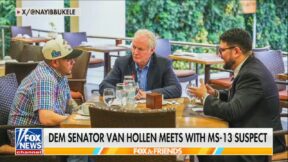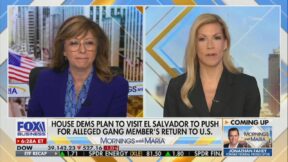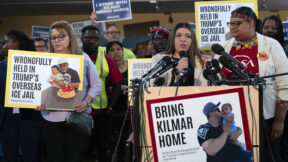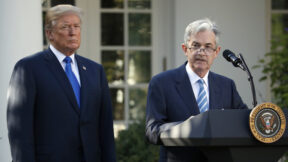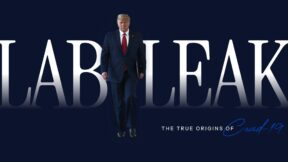Chuck Todd on Leaving NBC News, Covering Trump, and Why Algorithms Are ‘The Bane of Our Polarized Existence’
Chuck Todd, the veteran broadcaster who left NBC News in January after nearly two decades, including a nine-year stint as moderator of Meet the Press, had already given up on cable news years before his exit from the network.
“I had it on in my office all the time,” Todd told Mediaite editor Aidan McLaughlin on this week’s episode of Press Club. “But most cable news felt like a whole bunch of people trying to game an algorithm. It stopped being informational.”
Todd placed the blame for much of today’s dysfunction on the shift from journalism to entertainment. “Before 1994, news divisions were just told not to lose money. Then CNN made a boatload of money covering one trial, and everyone said, ‘We want in on this.'” He called CNN’s O.J. Simpson coverage “the beginning of the end of civilization.”
In a wide-ranging interview that covered everything from Donald Trump to tariffs to the future of the media business, Todd also spoke about NBC News reversing its decision to hire Ronna McDaniel, the former chair of the Republican National Committee, as a contributor — a move he publicly condemned on-air.
“It was a terrible look for us,” he said. “It hurt all of us — including [McDaniel].”
Todd argued that news networks have erred in prioritizing the hiring of partisan commentators over quality voices that help inform their audiences.
“Do we think Scott Jennings really knows anything about the Trump voter?” Todd asked. “He knows it the way you read a poll. He doesn’t live it and feel it anymore. Go talk to Trump voters and ask them what they think.”
He believes Trump’s return to power isn’t an anomaly — it’s a symptom of a media ecosystem that rewards spectacle.
“Donald Trump’s been the same. Go read the Playboy interview from 1990. In some ways, he hasn’t changed. We’ve changed. Our consumption habits changed. His behavior became ideal for this era of grievance-driven, outrage-driven clicks.”
And the future of cable news? Todd doesn’t think it’ll survive in its current form.
“It’s FM radio in the ’90s. Still monetizable but shrinking. Every day, there are fewer people. My guess is MSNBC is going to look a lot more like a YouTube channel than a traditional cable news channel.”
Instead, he sees hope in rebuilding from the ground up — especially with local journalism.
“National media’s never been trusted,” he said. “But people trusted their local journalists — because they knew them. It was the glue of a community. We need a thousand new local outlets. That’s how you start fixing this.”
Mediaite’s Press Club airs in full Saturdays at 9 a.m. on Sirius XM’s POTUS Channel 124. You can also subscribe to Press Club on YouTube, Apple Podcasts, or Spotify. Read a transcript of part of the conversation below, edited for length and clarity.
Aidan McLaughlin: I imagine you’ve taken a break from cable news since leaving NBC?
Chuck Todd: I had stopped watching cable news a few years ago.
You checked out?
I had it on in my office all the time. You had the four boxes. More for breaking news. But most cable news felt like a whole bunch of people trying to game an algorithm. It stopped being informational. I blame CNN for starting this with the O.J. Simpson trial. I believe that the beginning of the end of civilization started then.
Because of the central focus on a single story?
Correct. And more importantly, it sent the message to media executives that news divisions can make money if they make it interesting. Before 1994, news divisions simply were told not to lose money. And there was just an understanding that the entertainment, the sports, that’ll make the money. You guys just can’t lose money. Don’t waste money. Then CNN made a boatload of money. How much money did they make? They made so much money that NBC and Fox said, ‘Hey, we want in on this.’ There was one cable channel when the CNN trial started. There were three by the time he was tried again. That’s not an accident. It wasn’t because NBC and FOX said, ‘We need more news.’ No. It was, ‘We want to cover more narratives.’
Or, ‘We want to make as much money as CNN’.
So then it became, all right, how do you make the news interesting? I don’t mean to date you or myself—but it’s very hard for people to understand. I teach classes of kids in their 20s, and when I try to tell them about life during the O.J. Simpson trial, it’s probably like somebody trying to explain to me what the Nixon-Kennedy debates were like and how important they were. But we went to a totally narrative-driven media after that. Because right after O.J., we had Monica Lewinsky. After Monica, you had the 2000 election. After 2000, you have 9/11 and the Iraq War. And it became almost like made-for-narrative news coverage versus flipping the script and covering the news that mattered. Again, it goes back to taking the wrong lesson from the gobs of money CNN made by deciding not to be a news division for six months, and instead be Court TV on steroids.
It’s an incentive structure that is also the reason talk radio thrived. Because there was this view that if you sold every political development as a five-alarm fire — everything is the end of the world, every election is the last one — people would continue tuning in. But I don’t think cable news is as guilty of that as talk radio was.
No, and then I would argue big tech with the algorithms essentially realized that, ‘Oh, this is how it works,’ and then took what had been an organic development that talk radio guys knew all along—‘Hey, I can just talk about speed bumps, I’ll get people riled up, and I’ll get phone calls’. Whatever it is to engage people. And then we embedded it into this new news environment. And the problem now is, do people know the difference?
I think the decentralization of media is actually a huge problem.
It is, but I actually think we’ve done this before. I would argue we go into fits and starts of decentralization, and it usually is technologically driven.
Leading to creative eruption.
Correct. Think about when we first started to figure out how to reprint photographs — magazines came up out of nowhere. There were hundreds of magazine titles in the ’20s and ’30s and ’40s. And then the first radio stations. There were a lot of independent stations. So you get these bursts of creative, and then you get consolidation. Then you get bursts of creative, and you get consolidation. I think we’re in a burst of creative. The old traditional media is going away, and a new — this will be traditional media to somebody in 10 years. We’re building a quote-unquote new mainstream media. Mutual radio used to be a big deal. Life Magazine was part of the mainstream media. When they went away, did we lament, ‘Oh boy, mainstream media’s gone, we have no more Life Magazine?’ No, we realized it was a technological change. And I think this is really what we’re in the middle of. We just deal with it every day.
Well, let me tell you what concerns me about it. In regards to tariffs. Trump makes his announcement, it is a big shock to the markets, to the global economy. These are, pretty universally, seen as a bad idea. And there are a lot of supporters of Trump who agree it’s a bad idea. Ben Shapiro and Dave Portnoy are speaking out against it. The Wall Street Journal opinion pages are drenched in sweat. But I can also go on Twitter or YouTube and find MAGA Maoists who now yearn for the mines. We seem to be in a choose-your-own-adventure media scenario, where you can find someone to tell you that something that previously would have been universally condemned is actually good. And that’s been growing in the Trump era. Does that concern you?
So in that sense, part of it is decentralized media. I think there are two potential causes. I’m not going to sit here and say I definitively believe this is the cause. Two causes. Cause one was de-platforming Donald Trump after January 6, and him going, ‘Fine, I’ll start my own information ecosystem.’ I was not one of those people who was going to get on that parade of banning people from TV because they didn’t certify the election. But I think collectively, it looked like we all did that. And because some networks and some hosts grandstanded about it, beat their chests about it, but what they were really undermining was this little thing called the First Amendment. And what did Trump do? It would’ve been a lot better—he probably would burn himself out on January 6th—if he tweets forever on Twitter, if he’s never kicked off Twitter or Facebook. And then you let the public decide they want to mute him. But that wasn’t what happened. And then he goes and builds his own information ecosystem.
So Mark Zuckerberg got Trump elected twice.
He also got Barack Obama elected twice. It’s funny — I talked to somebody at Facebook recently. He said the very same tactics that Trump used in ’16, Obama used in ’08, and we were praised in ’08. He will sit there and say, ‘Almost identical.’ It became campaign interference. Did they use Cambridge Analytica? No, they were using other things, but the point was, Obama had famously hired tech guys.
Micro-targeted Facebook ads.
But here’s the other thing that I actually think has untethered a lot of people: it’s the gutting of local news. I’ve spent the last year and a half trying to answer two questions: How did we lose our trust? And what the hell has happened in local news? Are these startups having any traction? What’s working? What’s not working? And I have a cheap line on this. A guy named Craig thought classifieds should be free—yadda, yadda, yadda—Donald Trump became president. And the classifieds turned out to be the majority of the revenue for any newspaper with about a 50,000 circulation or less. The difference between local media and national media is that national media has never been trusted by the public. There’s always been some skepticism because we’re far away. You talk to Tom Brokaw when he was assigned to Atlanta to cover the civil rights movement—they hated NBC down there. They trusted the local journalists. And when the local journalist was reporting the same thing that the nationals were reporting, they were like, ‘Oh, okay.’
Was that because the local journalist was giving them information that pertained to them?
Correct. And I think what we have lost is the distinction between local and national media, which has always been national media tells you what you need to know in the big picture. When local media was at its best, it helped you live your life. So journalists were actually thought of highly because most people familiar with journalists were the local journalists—maybe their kid went to school with the journalist’s kid. They kind of knew them, and they might have a friend who knows somebody. So they knew that they were one of them. And local media, when it did help you live your life—helped you save money on groceries—you got to fact-check them every day. ‘Oh, I needed an umbrella.’ I think it was a glue to a community. And I think when we shattered it, people were looking for new community. They have found it, not in their geographical location. So I think we can’t fix this from the top down. I think we need a thousand new local outlets. I’m working on this. I have a thesis that we can use youth sports and high school sports as the new classified advertising—the new revenue stream to pay for the journalism. I don’t think non-profit is the answer. You get donor fatigue over time. It’s harder to scale. I don’t think corporate ownership with shareholders has been a great thing. And I don’t know if catering to your donors for your news division is either. So I do think we need to find a revenue stream. I’m hopeful that this massive explosion of college sports financing is going to create this sort of after-effect. It’s going to create a huge incentive for more parents to put their kids in youth sports, it’s only going to make that more of a focal point. And red jersey people and blue jersey people all want to see their kid play.
Have you been enjoying yourself since leaving NBC News?
I’ve had two employers since 1992. I’ll admit it was a little like jumping off a cliff. But here was the thing: up until the last year and a half at NBC, I had never worked at either company when we weren’t growing something. We’d had cutbacks. I had to lay people off at the National Journal—still the worst feeling I’ve ever had. You have to stare somebody in the face and tell them we don’t have a job for you. It’s awful. But in all of these places, whenever there were cuts—there would be cuts in one place usually for a technological reason—and then you were going to grow over here. For the last year and a half, NBC stopped growing. So it felt stifling.
You tried to grow out Meet the Press?
I viewed it as its own standalone brand.
Like The Today Show.
In fact, that’s what the model was to me, and this was something that the previous administration was very supportive of. I think that was the vision they saw.
Under Noah Oppenheim?
Yeah, I think it was the vision that you had these brands that you’d build out from.
Did you think you could monetize a politics brand?
Absolutely. Between live events and stuff, I think they’ve left a lot of money on the table. Basically, all these NBC talent would show up at somebody else’s live event, and you’re like, ‘What are you guys doing here?’ It was funny—when we were pitching this years ago, there was a time when the big networks said, ‘Oh, there’s not enough money, it’s not worth it.’ Now they’re desperate for any little dollar they can find. I now accept the premise, but when NBC first started putting out those product reviews where you get a piece of the action, I thought, ‘Oh my God.’ And then you realize—wait—AP’s doing this, Reuters is doing this, The New York Times? I still can’t believe The New York-effing-Times does this. Nobody in journalism school was taught that you should do that. And yet, every major journalistic organization has an arm now where they have to do that because you’re looking for revenue wherever you can find it. I wish we would move more to the title sponsorship and underwriter mindset. I joke, if you go back to the first pictures of David Brinkley and Chet Huntley broadcasting the conventions in the ’50s, there was a Union 76 logo right on the desk. And I remember I said, ‘Hey, I will trade Boeing’s logo on my desk at Meet the Press for an extra 15 minutes of air-time.’ It’s more news. It’s an opportunity for a longer interview, more context, and all this stuff. There’s a way to actually take your business model and rethink it, and I think news has to rethink it. I think we’re going to see that. I think more podcasts will be underwritten because we’re all figuring out how to fast-forward.
Politico did a very good job of figuring that out 15 years ago.
Yes, they’ve done that very well.
Is that why you left NBC News, because it felt like you weren’t growing anything?
Look, there wasn’t enough for me to do there. Everybody has a sell-by date at any organization they live at. They were willing to let me stay in a small lane, and I just wanted to do more. And thankfully, it was called The Chuck ToddCast, so I could take it with me. It was a negotiation, but a very friendly one. I may have had a very public dispute with some of the leadership, but professionally, I had no beef with how I was treated.
Let’s speak about the public disputes. The network hired Ronna McDaniel as a contributor. You were the first person to speak out about it on air. Why did you choose to speak out publicly? Because I know internally there was a lot of consternation about that, but nobody was speaking out publicly at that point.
I was worried about Meet the Press. Basically, the situation was, Kristen had booked the interview. After booking the interview, she was told she was a paid contributor and then told she still needed to do the interview. And I was like, ‘What are we doing?’ That had never been how we did paid contributors before. You did your accountability interview. Reince Priebus—I remember when he wanted to get into the paid role. And we went through it. I said, ‘Okay, you have to come on the show.’ And he said, ‘I don’t know if I’m ready to do that.’ And it always had been the case: before you put the person on payroll, you sort of audition them. How forthcoming are they going to be? I remember having a conversation once with Robert Gibbs before we signed him. I said, ‘Are you gonna be willing to criticize the Obama administration on something? We’re not asking you to go be personal.’ And they didn’t ever vet it with any of the actual working journalists. And that had never been the way we had done it. I’d always been, as moderator of Meet the Press, very involved. Anytime Phil Griffin wanted to assign somebody—there was a very high-profile former governor that we were negotiating with. And they were like, ‘Will you agree to put them on Meet the Press for a certain amount of time?’ I said, ‘Not until he sits down and does this interview.’
And Chris Christie wouldn’t?
This person—I’m not gonna sit here and confirm who it was—chose not to sign with us and signed with another network. But the point was, that was the process. And it was sort of a respect thing.
Why didn’t they follow the process? Was it new leadership?
I don’t know. Maybe it was new leadership. There’s always been this reputation that NBC journalists were a little bit more aggressive at helping manage the place, versus other networks. So there may have been a feeling of, ‘Well, why should they have any say, this is our decision.’ They may have been making their own business decision. Look, I think it was a terrible look for us. It hurt all of us. That was the problem. It hurt her. The whole point was to make Ronna McDaniel more believed. You can’t do it that way. You hurt her too. Anyway, the point is that Reince Priebus, before he signed with ABC, I think he did a sit-down on This Week, and answered the uncomfortable questions of, ‘Hey, you were the chief of staff…’ To me, it was a compact with your viewers.
I also think the vice that NBC was in was that you either have two options. Either someone like Ronna McDaniel forsakes the arguments that they’ve been making for the last five years about the 2020 election being stolen, or they defend Trump at all costs. Either way, you’re probably not getting much honest commentary.
But the other part was, if you actually understood — and this told me that the decision was made by people who really didn’t understand the political landscape — she was not MAGA. If the whole point was trying to find somebody who was MAGA — look, I believed in that.
She got booted from the RNC.
Right, because she wasn’t MAGA enough. So this was my frustration: tell me what you need, and let us help you get there. ‘Oh, you want that? Okay, let’s find some folks.’ There were plenty of folks that you could have signed—honest brokers who shared an ideological vision with the MAGA movement. There was a way to do it. This was not it. And it looked—I’ll be honest—like this had something to do with the debate. It just raised that question. And it was just so poorly executed, and again, not at all consulting anybody who actually has the credibility and relationship with the viewers.
It is a big challenge for news networks now because we’re no longer in a neat right-left ideological divide in a lot of ways.
I totally agree. When I was trying to put together a four-person panel — I think we live in a four-party country, and we just squeeze four parties into two. AOC and Rahm Emanuel are both Democrats, but they don’t agree, particularly on economic policy. Just like Rob Portman and Donald Trump are essentially from two different wings — or Mitt Romney’s probably more well-known.
That is a big challenge. And some networks have tried to solve for it by having people on the air who represent Trump and the people that voted for him.
Yeah, I don’t know what that gets you. Because I look at that, and I think this is what’s outdated — this idea of, ‘Hey, let’s just have stage right and stage left, and you just represent their talking points.’ I think we’d be better off now in this world — and it’s certainly how I want to go about this—which is: go to the voters. Go talk to Trump voters and ask them what they think. Then get a panel of experts and say, ‘How would you respond to that?’ Versus trying to have a pundit channel. Do we think Scott Jennings really actually knows anything about the Trump voter? He probably knows some, but he knows it the way you read a poll. He doesn’t live it and feel it anymore. And I feel the same way about the left. Let’s spend more time with the voters out there. You can do that, but the problem with that is that it’s a little more work.
And also, I think cable news is suffering a bit of an authenticity crisis. When you have people that are on air purely to give one perspective, no matter how silly it is…
I’ll give you one. It’s more superficial, but to me, Tesla selling cars on the White House lawn, that’s just wrong.
We know how people would have responded if it had been a different administration.
Correct. And so then to go out there and try to defend it? You’re making a fool of yourself. But the whole program’s making a fool of itself by even…
It’s theater.
It’s exactly theater.
Now that you’re in the independent media space, are you concerned at all about audience capture?
100 percent. I fear this all the time. I think this is the problem. You’re so worried about alienating an audience that you pull your punches. That’s the three cable channels. It’s amazing what you self-censor. ‘Well, I’m just not going to talk about that because I don’t want to be a hypocrite, so we’re just not bringing it up.’ You do this self-censoring. When I had Meet the Press Daily on MSNBC I was attacking it the way I attacked The Daily Rundown—doing news and analysis—but the audience wanted something else. They didn’t like that. ‘Don’t tell me that!’ And that was my first realization—like, whoa. It ends up just getting everybody mad at you, and then you can’t even have a conversation. I am very concerned about audience capture. I think if you diversify your guests on your podcast, you can at least minimize it. But I’m also making the case—“Hey, look, if you’re looking for partisanship, don’t come here. I’m trying to be explanatory. I’m going to try to be no BS.” I’m not going to curse just to curse. “Hey, look at me, I am cursing!” These silly videos that some elected officials are doing.
Democrats leaning into profanity. It’s embarrassing.
Come on. It’s an attempt at authenticity, yeah. But you’re 100% right. I’d ban algorithms. I think algorithms are the bane of our polarized existence.
When I go on the explore page of YouTube, it’s obvious that anger sells.
Are you seeing your explore, or is it mine?
This is personally curated for me.
That’s my point. I can’t stand this. I’ve got a 21-year-old and an 18-year-old. I have a nice little Gen Z focus group. One young woman, one young man. And you do see it. Like my son — big sports fan. He knows who Dave Portnoy is. In fact, he texted me this morning: “Hey, all of Trump’s fans on Barstool are mad at him over these tariffs.” I’ll say this. Six months ago, I never thought I’d have a tariff discussion with my 17-year-old at the time with Barstool Sports being the way in. Versus my daughter—she’s very much more Gen Z on the left, versus Gen Z… I don’t even know what to call this Dave Portnoy right. It’s not quite MAGA. It’s this “bro right,” I guess. It’s sort of a little libertarian.
What do you think about the future of cable news? Do you think it’s cooked?
I do. But I compare cable news right now to FM radio in the ’90s. It still has a big audience, it’s still monetizable, and there’s still money to be made. But it’s shrinking. Every day, there are fewer people. So for instance, what Comcast is doing is brilliant as a business—SpinCo. Just like Clear Channel is now iHeartRadio. And I think they were part of Limbaugh and all that stuff. There was a time when that was a massively large media company. I think now they are not valued nearly as much anymore. There’s still going to be cash to be made off these cable brands. But you’ll see the ones that survive will be individual brands that can translate to YouTube TV or to streaming, or however this world works. But cable TV as we know it now—I do think we’re going to see more Bari Weisses. So what do I mean by that? You might have 20 Substackers get together and start their own curated publication. You may get 15 YouTubers to say, “You know what? We’re a network now.” Just like I think Rush Limbaugh had a few people he was trying to groom in the talk radio space. But you can just see that in 20 years, there is no cable TV business. So if you’re Comcast, how do you extract value? But there’s still cash to be made. That’s the hardest thing for a media company. I was at National Journal when they still had a magazine, and they had this growing digital product at the time—it was called Congress Daily. And there was this debate internally. Some of us said, “You’ve got to kill the magazine now.” And others were like, “Well, there’s still 30 million in raw revenue coming in.” And that was true. But you knew it was declining. And you knew the future was here. That’s the toughest decision to make as a media executive. When do you make the jump? Because you’re going to cost yourself some short-term cash. Can you make your transition soon enough that it doesn’t take a hit? And again, I think Comcast—it did look like it was a little bit of performance. “Hey, look, Donald Trump, we’re selling MSNBC.” So I think the announcement felt rushed in order to make a…
You think that’s why they announced it when they did?
How often have you ever seen a company roll something out without the name of the company? They were still coming up with the name. So it did feel like they were literally building the airplane as they were…
And that was to avoid scrutiny from Trump on Comcast?
Possibly. I don’t know the motivation. The timing was fascinating. And they weren’t alone—every network seemed to make some announcement that felt like an offering to the king. “Here’s our offering.” But that doesn’t mean it’s not a smart business decision. They probably beat Warner Bros. to the punch. And my guess is, you will see the remnants of WBD somehow get consumed by SpinCo. And maybe they can take that and build something that survives the post-cable era.
The survival plan seems to be building up a streaming and digital operation that will eventually have enough revenue to offset the decline in cable.
My guess is MSNBC is going to look a lot more like a YouTube channel than a traditional cable news channel. I don’t know this, but that would be my guess.
